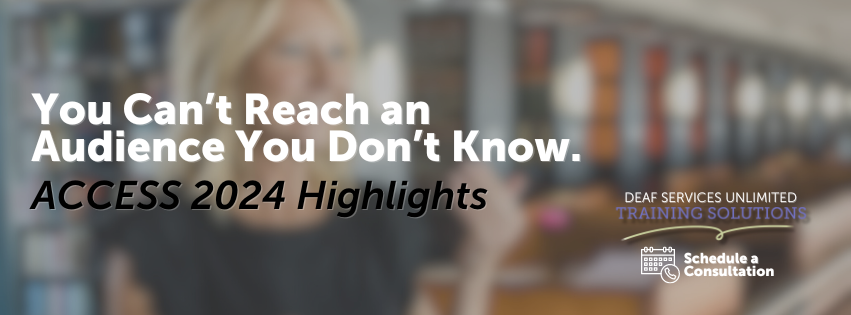Insights
all insightsACCESS 2024 Highlights

DSU recently attended ACCESS 2024 as both a Sponsor and Presenter.
ACCESS is one of North America’s premiere accessibility conferences. It is a FREE, two-day, virtual event that brings together key industry leaders, experts, and professionals from various fields to delve into the latest trends, innovations, and best practices in accessibility. With engaging keynote speakers, interactive sessions, and thought-provoking discussions, ACCESS provides attendees with a platform to learn, network, and collaborate with like-minded individuals on creating accessible and inclusive digital experiences for all.
The 2024 program gathered the most influential people in accessibility to explore challenges, provide actionable solutions, and share ideas to further the framework of inclusivity within all organizations.
Carly Anderson, DSU Director of Operations, and Brenna Thompson, DSU Director of Business Development, paved the way for attendees to learn new methods of engagement with all communities, and especially the Deaf and hard-of-hearing populations. Their presentation, Inclusive Communication: Reaching a Deaf and Diverse Audience, offered some useful take-aways.
The DSU team focused on 3 key areas:
- Insights into the Deaf & hard-of-hearing market
- Common Barriers that make a business’s products or services inaccessible
- Benefits of being proactively inclusive
MARKET
Many people are unaware of how large the Deaf or hard-of-hearing market is. More than 1.5 billion people worldwide have a hearing loss. In the United States, 48 million Americans have hearing loss. That’s over 14 percent of Americans.
It’s important to note that when communicating with this market, like many other market segments, there is no one-size-fits-all solution. Understanding how Deaf and hard-of-hearing individuals communicate is a big first step. For example, some people will use ASL as their primary language, while others use English with the assistance of auditory hearing devices.
Because of these linguistic differences, communication access can look different for someone who identifies as Deaf and someone who identifies as hard-of-hearing. For a Deaf individual who uses sign language as their native language, English captions, English captions are not considered an equitable communication accommodation, as they require Deaf individuals to receive information in a secondary language.
BARRIERS
While differences exist in communication processes, there are many similarities in the barriers that ASL or English speakers who are Deaf or hard of hearing will face.
Common Barriers for the Deaf and HoH Audience
- Media without captions
- Audio without transcripts
- Limited customer support options
- Limited understanding of Deaf culture
- Lack of sign language interpretation
Note that the ADA (Americans with Disability Act) requires that captioning be provided for Deaf or hard-of-hearing individuals when needed. Section 508 and 504 of the Rehabilitation Act requires electronic communications and information technologies such as websites.
Beyond legal requirements, businesses that work to remove these barriers will improve their chances for reaching this diverse audience and for doing business with this significant consumer group with specific needs and preferences. Accessible businesses demonstrate a commitment to inclusivity and equal opportunities for all individuals. By making businesses accessible to the Deaf community, they companies can tap into this market and expand their customer base. It allows businesses to attract and retain Deaf customers resulting in increased sales and revenue.
BENEFITS
Benefits of Including the Deaf and HoH Market
- Inclusivity and equal opportunities
- Expanded customer base
- Legal compliance
- Employee diversity and productivity
- Reputation and brand image
The DSU presentation highlighted inclusivity, with a focus on how to reach the Deaf and hard-of-hearing segment of our population. Carly and Brenna offered background information on communication processes and strategies for businesses to better reach this audience. Making the effort to be inclusive and more accessible will open doors to new opportunities for businesses and organizations who would otherwise be missing out.
For more information, watch the recording of the full DSU ACCESS presentation here:
https://www.3playmedia.com/access/2024-hub/inclusive-communication/
